DEADLY AIR
Air pollution in Gauteng at dangerously high levels this winter
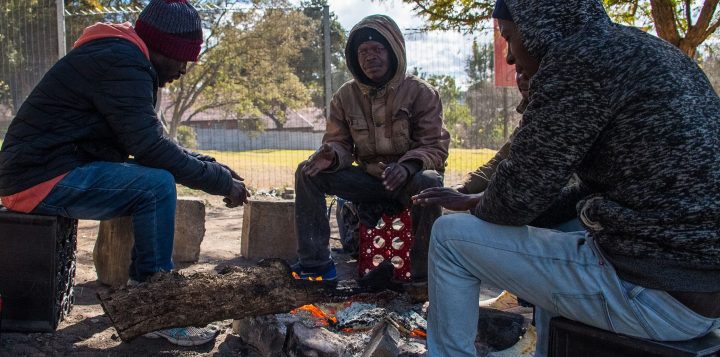
It might come as no surprise that every winter — with more people burning fires, switching on generators and using more electricity to keep warm — the air quality in cities deteriorates. But what should be alarming is that the air quality in the Gauteng region this winter is worse than it has been in years, with an increase in harmful pollutants.
In the past 30 days, emissions in Johannesburg peaked at dangerous levels, with harmful pollutants like fine particulate matter reaching the highest monthly average (72 micrograms per cubic metre of PM 2.5, or fine particulate matter) since at least 2018, based on data from the South African Air Quality Information Centre (SAAQIS).
“That’s almost five times the WHO [World Health Organisation] guideline for 24 hours [for fine particulate matter],” said Lauri Myllyvirta, lead analyst at the Centre for Research on Energy and Clean Air (Crea).
“This guideline shouldn’t be exceeded more than three to four times per year, but in Johannesburg, the average for the past 30 days exceeds it several fold.”
PM2.5, or fine particulate matter, refers to tiny airborne particles smaller than 2.5 micrometres. Myllyvirta explained that this measurement matters because “they’re small enough to pass from lungs to the bloodstream and wreak havoc on all our internal organs”.
Exposure to PM2.5 at this level (Joburg experienced 72 micrograms per cubic metre on average this month) can increase the risk of respiratory and cardiovascular problems, especially for sensitive individuals such as children, the elderly and those with pre-existing health conditions. Fine particulate matter is the most harmful air pollutant, responsible for millions of global deaths every year.
Daily Maverick asked Crea to look into it, so Myllyvirta and Crea’s data lead, Hubert Thieriot, got to work using air quality data from SAAQIS, fire data from Nasa and meteorological data from the US National Centers for Environmental Prediction. Their modelling of weather and fire effects uses machine learning models developed by Crea.
Does the air quality worsen in winter?
Yes. But while this is naturally occurring, this year is worse than usual.
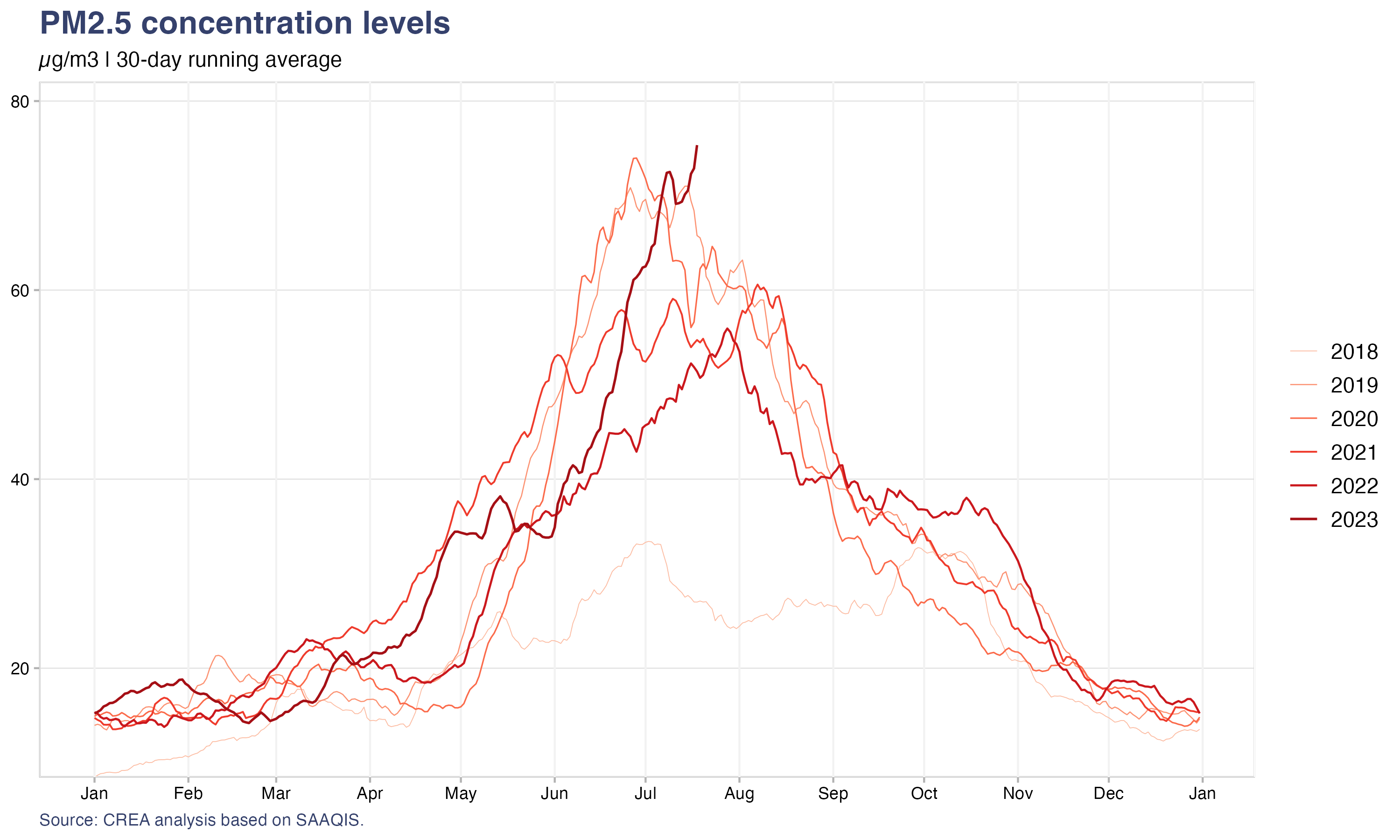
As evident in the graph above, which shows PM2.5 every year since 2018, emissions spike every year over the winter months.
PM2.5 can be generated from the combustion of coal, oil and biomass directly. Natural dust and road dust also contribute, and emissions increasing in winter seems logical, as more people will make fires and use more electricity to keep warm.
However, Myllyvirta said that typically, the atmospheric conditions in winter were the main reason for deteriorating air quality, explaining that this was a natural occurrence:
“It is an almost universal thing that, with less sunlight, there is less vertical mixing and therefore higher pollution at ground level.”
This winter is worse
But Myllyirta said adverse weather alone cannot account for the high pollution levels seen this year.
Crea used its machine-learning models to predict what the pollution levels in Johannesburg would look like based solely on weather conditions — assuming emissions were at a typical level — compared with the actual observed emissions experienced.
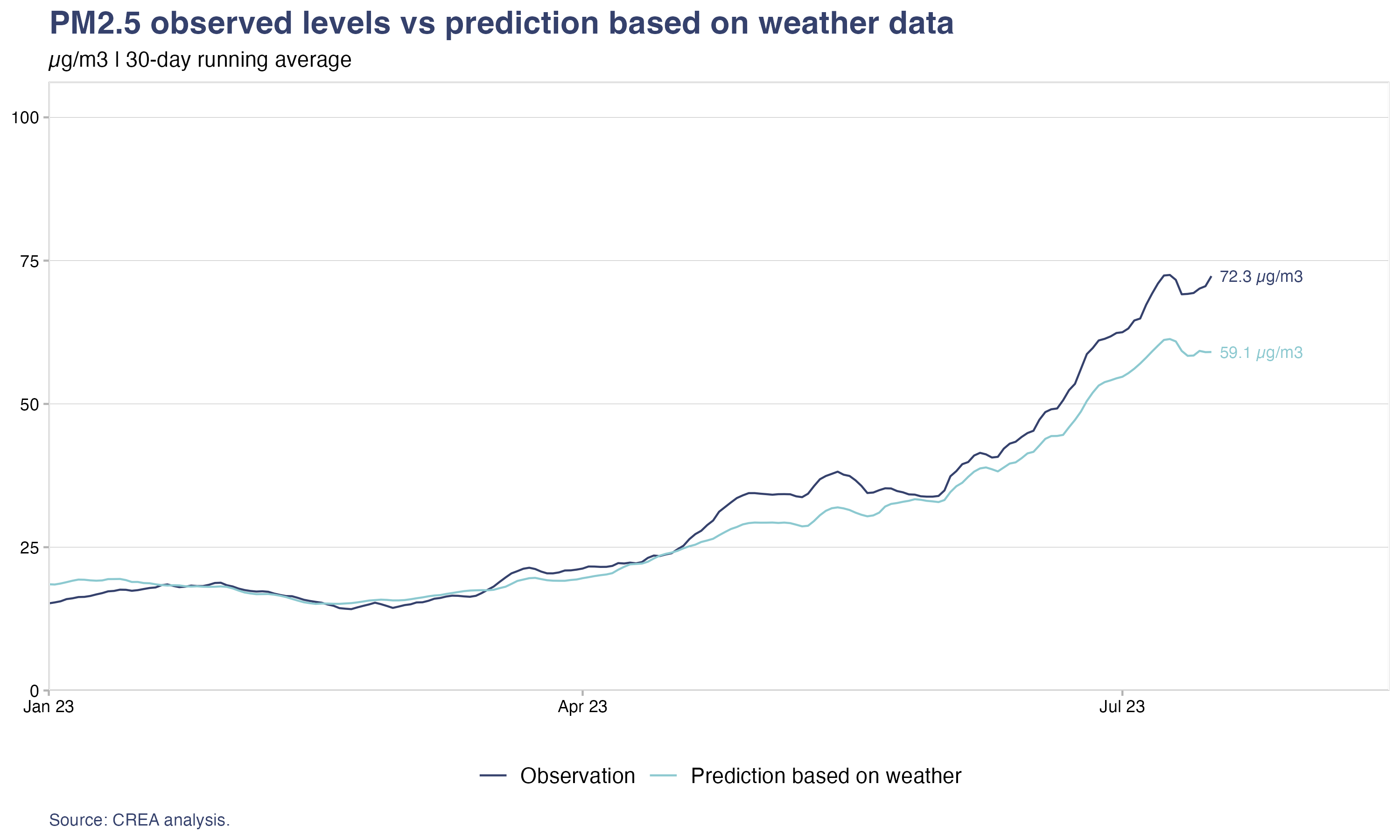
As depicted in the graph, the emissions Johannesburg experienced (the dark blue line) are higher than the model predicted if it were just due to atmospheric conditions.
Crea’s models showed a 13 ug/m3 “anomaly” between predicted and measured pollution levels, which indicates that this is due to differences in emissions levels between this year and earlier years, and not just atmospheric conditions.
So what is contributing to these increased emissions, if not natural atmospheric conditions alone?
Fires not the main culprit

Fires detected by Nasa satellites on 19 July 2023. Crea says that this looks like much more fires detected than in the summer months. (Source: Nasa)
Crea found that open fires detected from satellites rose and peaked earlier than usual this year.
“Our machine learning models take into account fires detected from satellites when predicting air quality,” explained Myllyvirta.
“We can gauge the impact of fires by excluding the fires from the input data to the model.”
While Myllyvirta noted that the pollution was always a mix of different sources — and there is a different mix every day — on a specific day this month the ratio of certain pollutants (fine particulate matter and particulate matter) indicated that open fires were a significant source of these increased emissions.
Myllyvirta explained that in many instances around the world where there were air pollution episodes caused by open fires (eg crop residue burning), there was often a very high ratio between fine particulate matter and particulate matter since open fires emitted a lot of coarser particles because there were no emission control devices to filter out the larger particles.
As depicted in the graph below, for a few weeks in June and July, many more fires affected air quality in Johannesburg compared with previous years.
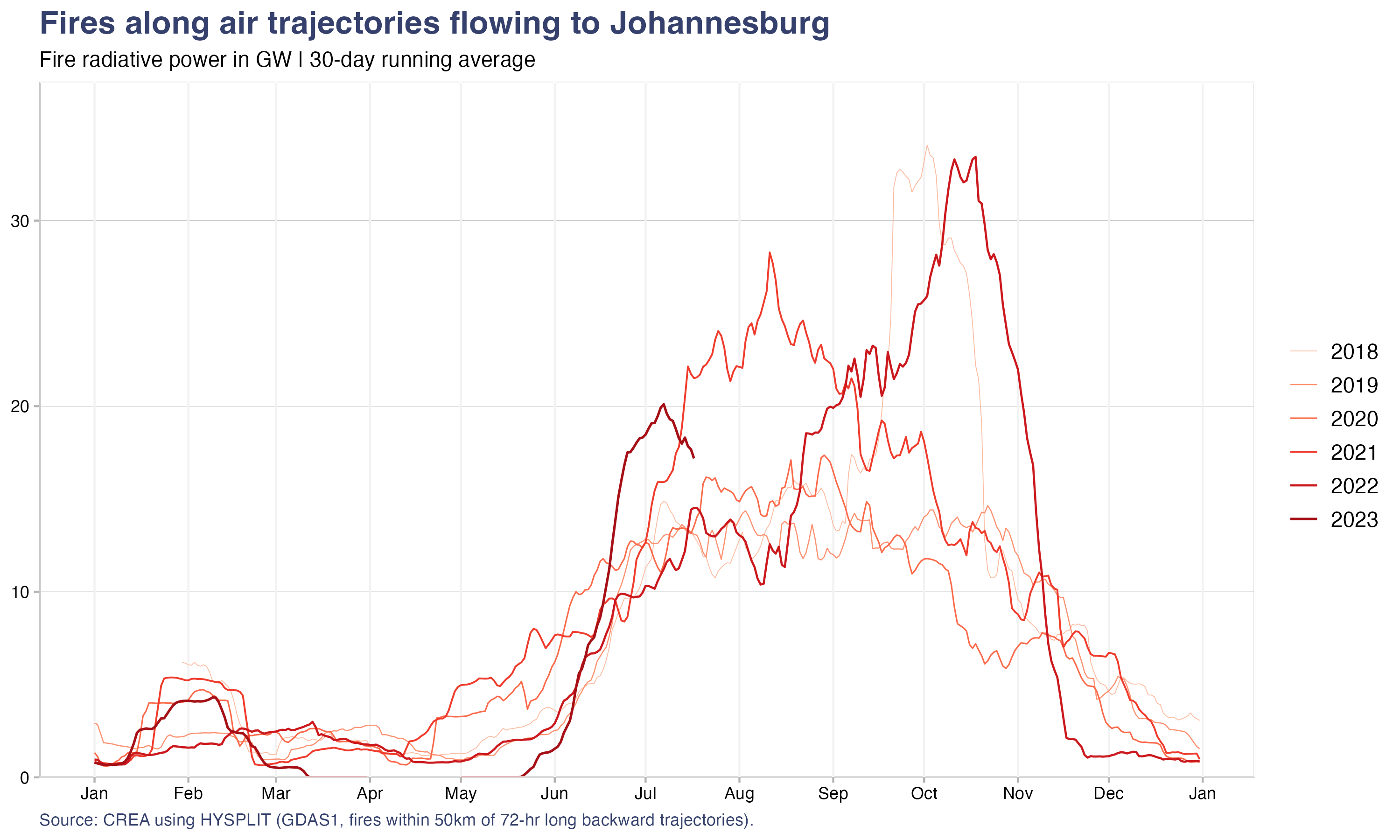
“However, more recently, the number of fires has fallen to a more typical level, but the higher-than-average pollution has intensified,” said Myllyvirta, explaining that Crea’s modelling found that over this month, the fires’ contribution to pollution was minor.
Pollution from burning fossil fuels
“If open fires were the main culprit [of this deteriorating air quality], we would expect a low particulate matter ratio and low sulphur dioxide levels, as open fires emit a lot of coarser particles but almost no SO2 [sulphur dioxide],” said Myllyvirta.
But the data shows that when emissions peaked, there were not just particulate matter emissions, but also high levels of nitrogen dioxide (NO2) and sulphur dioxide, which means increased emissions can’t be attributed to fires alone.
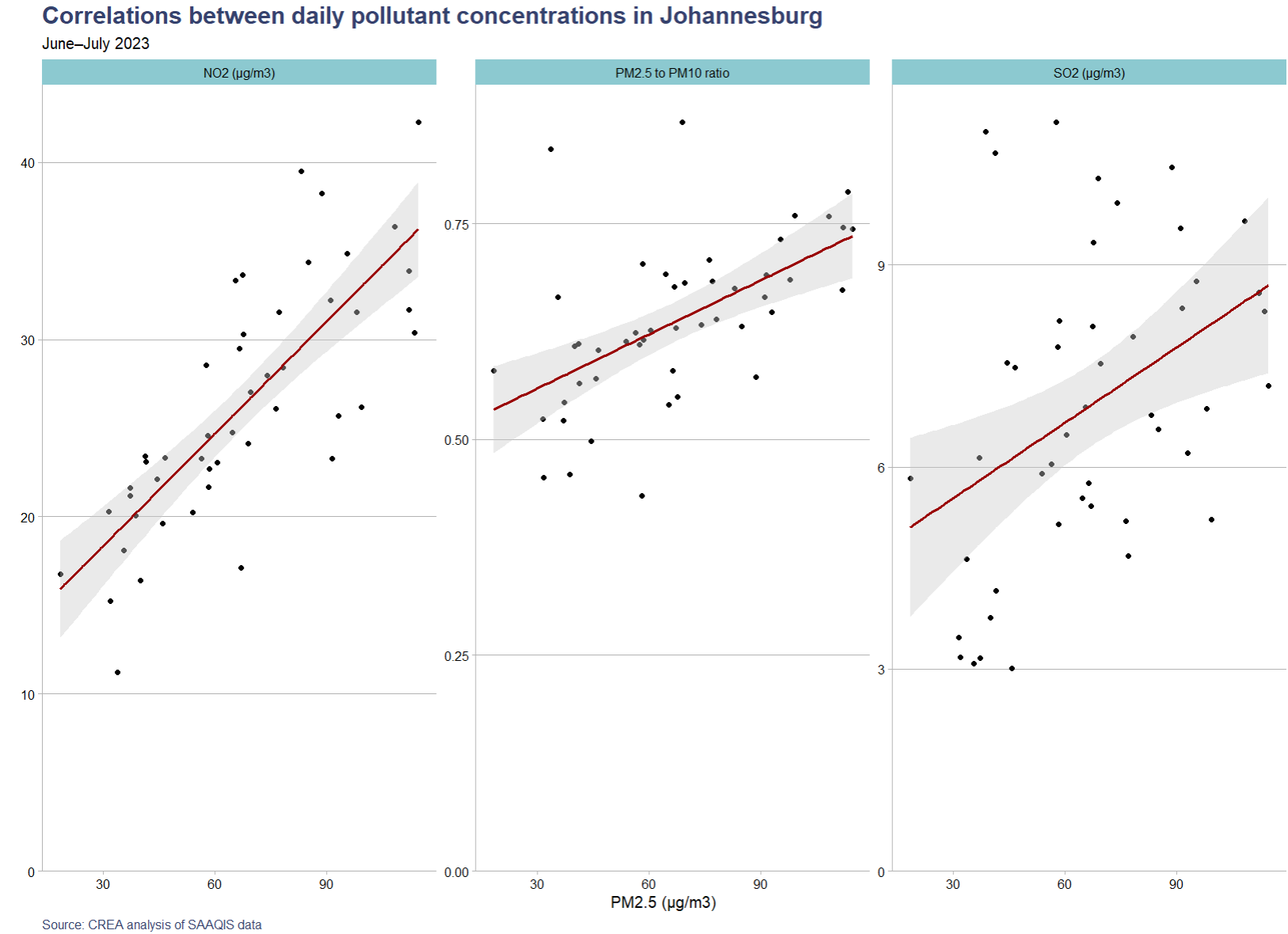
Myllyvirta explained that NO2 is associated with all fossil fuel burning, including petrol and diesel used in transport and generators.
“PM2.5, SO2 and NO2 are all dangerous pollutants that increase the risk of death and many diseases,” said Myllyvirta.
While these levels are higher than in previous years, this is not a new phenomenon.
At the 16th air quality governance lekgotla last October, the Department of Forestry, Fisheries and Environment presented data showing that many areas in SA (including Gauteng, Mpumalanga, Free State, the Vaal Triangle Airshed Priority Area and part of the Western Cape) had concentrates of fine particulate matter and particulate matter that exceeded national ambient air quality standards.
Read more in Daily Maverick: Much to be done to improve air quality in parts of South Africa
Emissions from power plants
Satellite-based measurements of NO2 levels, which correlate closely with the amount of fossil fuel burning (including from power plants), show a significant increase year-on-year in Mpumalanga, but a drop in Gauteng.
Mpumalanga is the energy hub in SA, where most of SA’s coal-fired power plants (that produce 88% of the country’s electricity) are based.
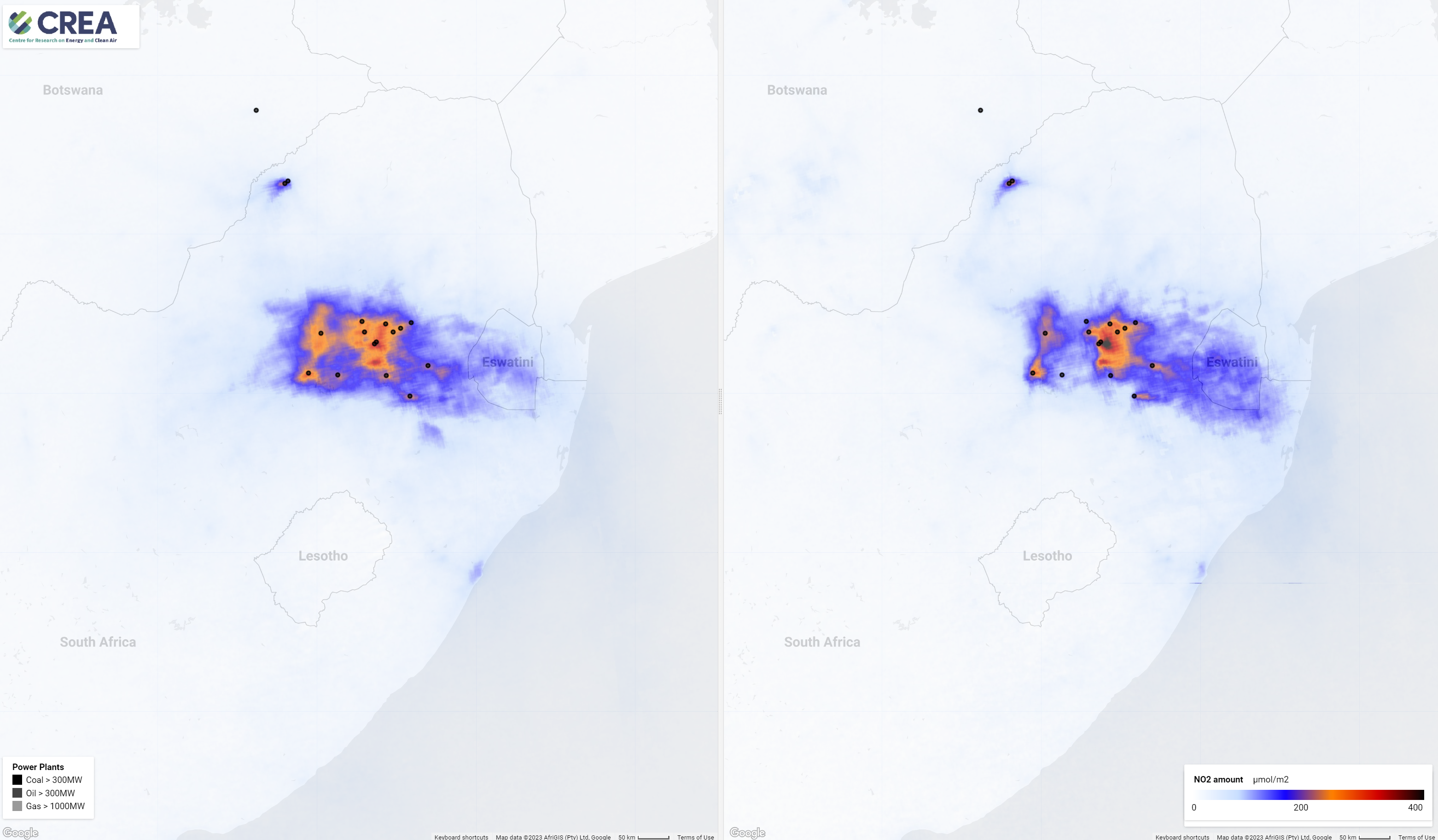
Map depicting NO2 levels detected from satellites in June-July 2022 (left) and the same months in 2023, which indicates increased emissions in Mpumalanga, decreased in Gauteng. (Source: Crea)
“Therefore, increases in local emissions are unlikely to play a role,” said Myllyvirta.
“Eskom has reportedly been working hard to increase power generation at its decrepit power plants and increasing the use of diesel to make up for shortfalls in available capacity, which is likely a significant part of the explanation.”
While N02 emissions can be generated from all fuel-burning — as it’s generated from the nitrogen in the air in high temperatures — Myllyvirta explained that SO2 was associated only with the burning of coal and fuel oil in power plants and industry, because gasoline and diesel had most of the sulphur contained in crude oil removed during refining.
“South African power plants and industries lack control devices for SO2 that are routinely required in many other countries, therefore the SO2 emissions are huge,” said Myllyvirta.
Myllyvirta previously told Daily Maverick that “the single most important standard is the standard for sulphur dioxide emissions because those are the ones that are responsible for the vast majority of the health impacts from the power plants”.
Department of Health’s outlook
A 2017 study by UK-based air quality and health expert, Mike Holland, who visited the South African coal belt, found that air pollution from coal-fired power stations killed more than 2,200 South Africans every year, and caused thousands of cases of bronchitis and asthma in adults and children annually.
As these dangerous levels of emissions pose a significant health risk, Daily Maverick asked the Gauteng Department of Health if they’d noticed a spike in health cases in conjunction with the spike in emissions.
“The department does take cognisance of the air quality status as indicated by the data from the South African Air Quality Information System and the low temperatures which may result in more open fires as people attempt to keep warm,” said spokesperson Motalatale Modiba.
“As for the health impact, we do not have data to compare the past years and 2023… the primary healthcare tick register does not have a data element that links conditions that patients present with to climate change-related illness/conditions or quality of air,” said Modiba.
“This kind of data would normally be in the patient record, not in the data that is analysed routinely in the district health information system.”
Cold winter
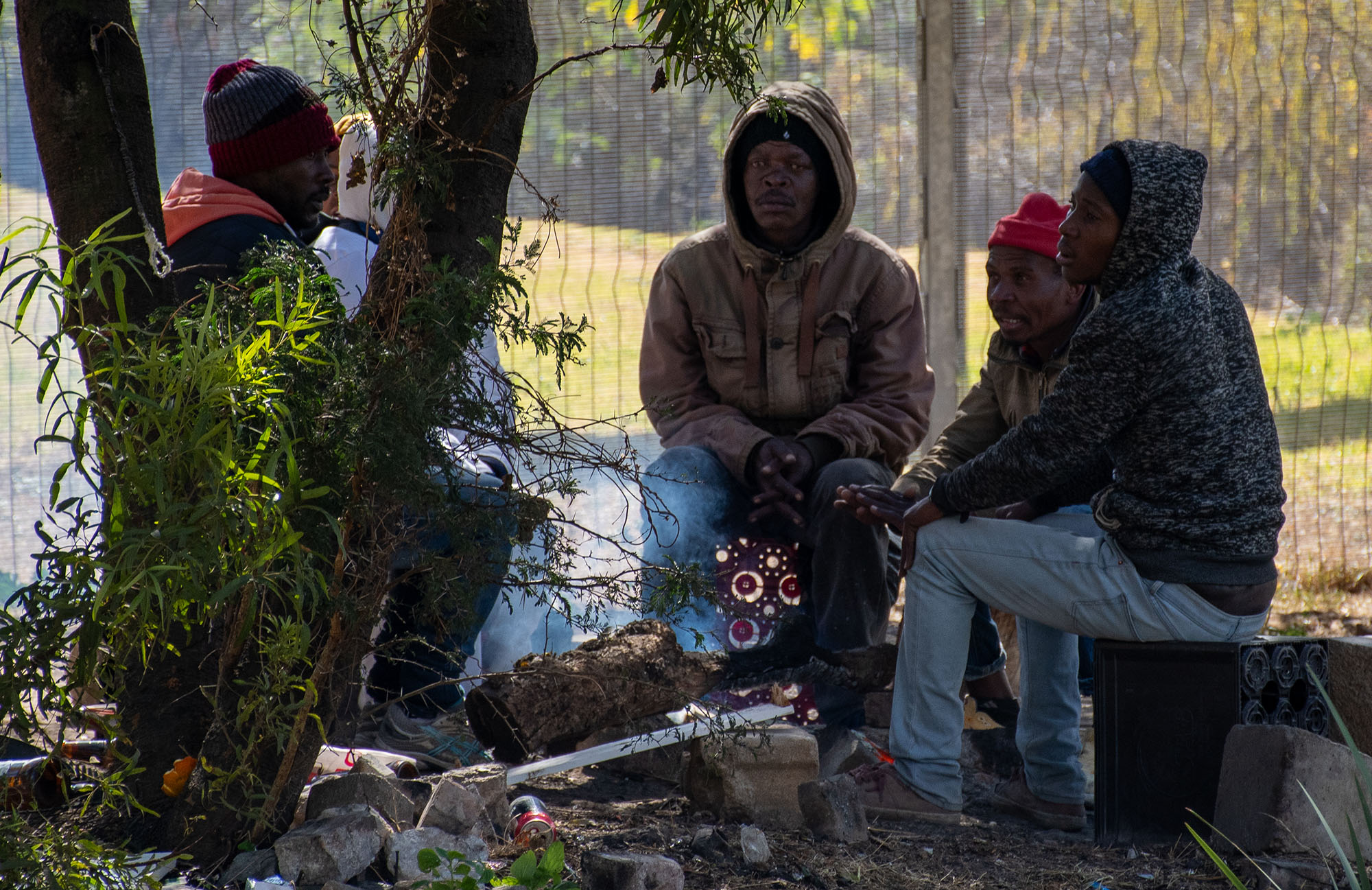
Street vendors huddle around a fire on 10 July 2023, the coldest day of the year. (Photo: Julia Evans)
This has been a bitingly cold winter, with temperatures dropping to -3C in Johannesburg, -4C at OR Tambo and -5C in Vereeniging), leading to snowfall in Gauteng.
Sitting next to a small fire near the intersection of Sandton Drive and William Nicol Drive, Karabo Mahumane spends his days as a musician busking out in the open. He said this winter had been particularly harsh.
Tiney Chikanga, who sells handcrafted beaded sculptures at the intersection, told Daily Maverick that while he has enough clothes to get him through this winter, he is worried about those who don’t. DM
To read all about Daily Maverick’s recent The Gathering: Earth Edition, click here.










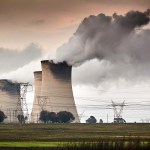
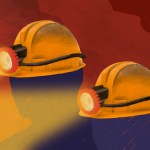








“Air quality in Gauteng at dangerously high levels this winter” -scary when the air quality is so high 🙂
“Air quality in Gauteng at dangerously high levels this winter”
If the air quality in Gauteng is poor, then it can’t be at dangerously high levels. Surely the quality must be at dangerously low levels?
The headline “Air quality in Gauteng at dangerously high levels this winter’ sounded sarcastic … should “quality” rather not have been “pollution” ?
Ah you don’t believe we are on the eve of destruction.
“air pollution from coal-fired power stations killed more than 2,200 South Africans every year, and caused thousands of cases of bronchitis and asthma in adults and children annually.”
Including me.
Don’t forget the power generators, especially diesel (diesel has four times more toxic gas pollution than the equivalent in petrol), that have industrial standards operated by arrogant owners in residential areas, spewing diesel fumes during load shedding. Breathing the fumes for hours do have toxic effects. Take legal action against these people with industrial kilo watts production over 10kw per hour. Otherwise I look forward to meeting those like me in the respiratory diseases wards or cancer clinics soon! What a terrible spin off of load shedding! Increase in bronchitis, asthma, allergic reactions, pulmonary fibrosis (cruel way to die) and lung cancer is perhaps what we will see within a year or two. Could we sue Eskom and the ANC government? Well we will never see the money in our (shortened) lifetime.
When a respiratory disease was going around, government had no problem instituting a lockdown and arresting people and beating them up for violating it.
But now that the respiratory disease is the air pollution caused by diesel generators and needlessly polluting SUVs and 4x4s, the government is suddenly impotent?
Just another sign of their complete incompetence.
SA Constitution Section 24:
Everyone has the right
a. to an environment that is not harmful to their health or well-being; and
b. to have the environment protected, for the benefit of present and future generations, through reasonable legislative and other measures that
i. prevent pollution and ecological degradation;
ii. promote conservation; and
iii. secure ecologically sustainable development and use of natural resources while promoting justifiable economic and social development.
And yet again, like most other rights supposedly granted to us by the Constitution, the ANC pretends it has never heard about them and ignores the Constitution it co-authored.
One also has to wonder what happened to the zeal (authoritarianism) with which the government tried to “save lives” during the pandemic. Why is this same zeal not applied to save the 2000 lives lost and many thousands harmed every year through this ongoing air pollution? Are they somehow less important?
Instead, the national “safe” SO2 levels were doubled in 2020, there is no policy to discourage people from buying and driving Diesel-heavy polluting SUVs and 4x4s, and it took the government to 2023 to finally introduce fiscal incentives for buying and installing solar panels.
The ANC will kill you and laugh in your face while they do.